Perfex

(Lodge cast-iron skillet embossed with the Scout symbol. You can also get them in plain civilian. Photo Lodge Co.)
So, town started to empty out for the long weekend on Thursday afternoon. I felt like joining the anxious motorists on the happy highway south, but I am tethered to the pool for the last four precious days of hydrotherapy.
The recovery continues, albeit slowly, and I have managed to open the aperture to other things. The kitchen beckons- savory vegetable soup and stews are beckoning, and white chili and all sorts of slow-cooked autumn stick-to-your-ribs comfort meals.
I sadly cast off the Swiss Diamond ten-inch skillet. I had been wildly enthusiastic about the space-age coating, advertised to contain the dust of actual industrial-grade gemstones. It certainly cost as much as jewels.
I managed to burn off all the coating in only four years, or rather have transferred the coating from the fry pan to my intestines, which is a bit of a disconcerting thought. Furthermore, the steady process from non-stick surface to absolutely stick-to-everything resulted in food that had to be scraped off, a challenging process with the plastic spatulas that were intended not to scratch or mar the precious slipperiness.
I don’t know about you, but there is something about a fried egg sliding happily around in a skillet that conveys a sense of order and justice in this wider world, which is completely untrue. I just pretend that if I don’t break the yolks, and load up the eggs with freshly ground pepper
Four years is a pretty good run for a pan, but not in the same league as the trusty and well-seasoned cast iron fry pan I keep in the oven as a platform for slow-roasting.
You must have covers for the pans, though, and I started to look around for ideas. You can occasionally find a decently-seasoned cast iron pan at the swap meets and flea-markets. Even a rusty one can be brought back, with enough TLC: that is the beauty of cast iron.
More with sadness than anger, I retired the Swiss Diamond and took delivery of a twelve-inch skillet from a family-owned business nestled in the slopes of the Cumberland Plateau of the Appalachian Mountains, near the hamlet of South Pittsburg, Tennessee, (population 3,300).

(Lodge Skillet Pioneer Joseph Lodge. Photo Lodge Co.)
Lodge Cast Iron has been casting cookware during the first presidential term of William McKinley. The second one was not a good one for the President, as you know, but according to the Lodge website, some of the Lodge skillets, griddles and Dutch ovens are still turning out tasty dishes on still-slippery surfaces more than a century later.
The twelve-incher features stainless steel handles, fore and aft, and a nice glass top. It would be perfect if I was regularly cooking for a family or a fire-house, but alas, I am not. It takes up a major portion of the gas cooktop, and I cycle it through the oven when I don’t have people coming over for dinner. To fill in the mission-area for breakfast cooking, I added a six-incher with a cast iron lid that is purely amazing for eggs.
The sunny-side up delicacies float over the surface as if they were on tiny ice-skates, and lend an air of certainty and confidence to the day.
The whole suite of spatulas and cooking implements needs to be replaced with implacable stainless steel, as a side light, but there are other issues beyond that, of course.
The most basic condiments- salt and pepper- need attention, too.
Since I was in domestic mode anyway, my ears pricked up when a pal wrote me about the most triumphant qualities of a $90 pepper mill, imported from Europe.
Perfex.jpg
(Perfex 4-1/2 inch pepper mill: the state of the art in grinding.)
The Perfex Co, Ltd., produces a short grinder that is supposed to be a life-time issue item. The family-owned business has been making the crank-operated mills in Saint-Étienne, France, for half a century. They combine superb functionality with sensible, no-frills design to create a true classic. The grinders are cast of solid aluminum, and with grinders that will never dull and always produce fine-to-course quantities to enliven the cooking experience, and which is handsome enough to travel from kitchen to dining table.
I went to Amazon and found the Perfex brand (there are counterfeit versions out there, so caveat emptor) and discovered that I could get one for dollars less than the MSRP, and the helpful commentary that shoppers like myself often bought the matching salt grinder and a bag of Irish sea salt for as little as $178.00, eligible for free shipping, too.
I clicked off the site without executing the deal.
Obviously things are not as bad as they appear, if people are still concerned with condiment dispensers that cost almost a c-note.
Oh, there was a nomination or something last night, too. I listened to one of the speeches on my water-proof radio in the pool as night nestled into Big Pink. The voices describing the convention dripped with sarcasm, and I smiled in the darkness, stroking through the precious last few days of outdoor swimming.
It was a great gimmick, having Democrats do the commentary on the Republican convention. In the interest of fairness, I assume NPR is going to roll out some Republicans to do the play-by-play when the Democrats have their convention in North Carolina.
Hahaha. Just kidding. I am going to go fry some breakfast. With the new skillet, that is one thing that isn’t going to get screwed up. The eggs will be Perfex.
Copyright 2012 Vic Socotra
www.vicsocotra.com
Office Hour
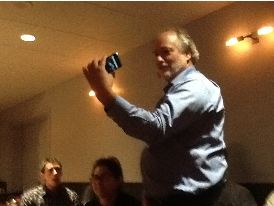
(Professor Charles Severance of the Unvisersity of Michigan, aka Doc Chuck, takes a video of himself to post on the Coursera homepage of his history of the internet course. Photo Socotra.)
I think I told you I am taking that Coursera internet class on the history of the world wide web. That is symmetry, for you. Coursera claims it offers “Higher education that overcomes the boundaries of geography, time and money!”
Well, the course is free, and sometimes you get more than what you pay for
Our Rock Star Professor, Dr. Chuck, was here in town to hold an “office hour,” just like we were students on a real campus with a real professor.
Actually, that is bass-ackwards. He was here to use the summer break from the regular academic year at the University of Michigan to do commercial consulting. He was billing a few hours this week to Blackboard, a distance IT learning concern that has a mission statement that promises to “…help you transform the educational experience within every step of the student lifecycle. Get the technology and expertise you need to meet your institution’s goals.”
That is sort of why I am taking the course in what passes for my spare time. Dr. Chuck set up shop in the basement of Teaism, a coffee house near Archives in the District. I decided to go and hear in person Dr. Chuck’s views on this amazing transformative technology. I dipped my toe in the process while still confined to bed, and in parallel with the recovery and the getting-back-to-work thing.
I am not 100% on walking yet. Going to Office Hour with Dr. Chuck would have been simple enough by Metro, though I hate public transportation, and basically gave up on it after the Madrid train bombings a while back. The “free” opportunity to access the Rock Star Professor wound up costing $40 in cab fares, but it was better than circling endlessly looking for a daytime parking place for the Panzerwagen.
There was no story yesterday, since I spent the discretionary morning time at the Mercedes dealer having them purge the stern Germanic admonition from the dashboard insisting that I have the vehicle serviced at 20,000 miles (it had been, according to the dealer) and why my iPod did not play through the vehicle’s surround sound system.
You will be gratified to know that I left the service lane blasting “I Feel Free” from an old play list on my personal music device.
When I alit from the cab and wobbled toward the coffee house, I realized I am not close to being fully ambulatory, and the trip down the stairs to the dark dungeon of the basement overflow area was a challenge. Doc Chuck was holding court in the corner with about a dozen acolytes, of which I quickly became one.
Dr. Chuck is youthful despite his thinning gray hair. I listened to him and his enthusiasm and found it infectious. My classmates, suddenly non-virtual- were an interesting assortment of aluminum-foil helmet folk and practicing engineers.
It was quite intoxicating, the next hour, as he discussed a course that had as many as 40,000 enrolled at the front end, and in Week Six still had 6,000 of us completing the on-line course work. He is a sly dog, the Doc is. He sucked us in with the people who created this amazing digital communications/shopping/sharing/porn-and-music sharing medium, and then actually got into some basic engineering to actually help us understand what we have gotten into.
I don’t know what to think about this experiment, except to note that it is about like everything in this wired world; real and unreal, connected and somehow isolated.
I am going to do the extra-credit essay this weekend, and get ready for Week Seven and the 30-point final exam. Then, Dr. Chuck will try to figure out what worked, and how this astonishing bit of interactive technology can be improved.
It is sort of neat to be in on the ground floor of this. I thanked Dr. Chuck for the opportunity to see the future, and limped up the stairs to find a cab and leave the reality of the in-person office hours to return to my real office and my real life, though it is far more digital than I could ever have imagined.
Anyway, time for the course this long weekend, and I will do my best to prepare for the big final. Or not. So long as the pool is open, it is compelling to get down there and stroke away for an hour- it is making the leg stronger, day by day, and it is going to be a real jolt when then gate is closed next Monday night, and the season, broken only by those last four melancholy weekend days.
Traditionally, I am the first in the pool and last out for the season, but obviously, the opener was spoiled by the surgery, but I may put a “period” on the season and be the last one just for fun.
I counted: I hold the undisputed record of a decade, first and last, and that may be good enough.
With the internet course, and the University of Coursera. I am certainly one of the first ones in the pool, but I will definitely not be around to be the last one in.
Copyright 2012 Vic Socotra
www.vicsocotra.com
Designated Area
(Imagine here a picture of the pool in darkness. Thank AOL for not being able to insert it)
Montana was on a couchette with her ear-buds in on the west side of the pool deck. This is highly unusual. She normally sets up camp at the north end of the pool, by the scraggly shrubs. Jim and Gary, the new couple who moved into 805 were down there, and Jim was puffing one of his persistent cigarettes.
It was sort of weird. I make a practice of not smoking when Montana is around- she is a hyper green person with a vast knapsack of real and imaginary maladies, of which an aversion to second-hand smoke is one.
Being a new guy, Jim apparently is not aware of Montana’s sphere of personal space, which expands to the entire pool deck when she is there. Gary was paddling near me, and I had allowed the iPod to get low on charge, and I could not defend myself by sticking the earphones in and treading water in solitude.
The sun was down, as the rhythm of the changing season advances, and the anxiety of the imminent closing of the pool was heightened in the darkness. Gary was chatty, and since distraction of any sort from the boredom of the repetitive stroking was welcome.
I told him about some of the history of Big Pink, and the neighborhood around it, and how things came to be the way they are. Jim puffed his cigarette in his chair on the pool deck, a long way from the designated smoking area that had provoked a pitched battle in front of the Condo Board three years ago.
That little weasel who was appointed without election to the Board to fill a vacancy had pulled a parliamentary maneuver, not under “old business,” but as new, and got the pool declared a non-smoking zone after the period for general comment was done.
It was policy by decree, as far as I was concerned. There was enough of that crap going around and I got up on my high horse about it.
The Pool Rules had been circulated before the beginning of the season, and there was no mention of a change of policy. It was a highly anticipated review of the rules after the famous Revolt of the Grandmas the season before, and the young crowd that held reckless buffet dinners on the pool deck in direct contravention of the Rules.
Smoking had been permitted anywhere outside (and in, for that matter- check the giant ashtray on the trash container in the foyer) since 1964.
I commenced a Quixotic quest to collect signatures to designate a little area for puffing, right adjacent to where the grill sits outside the fence. Between the two sources of smoke, I figured that was a reasonable compromise against the Nanny Building, since I think it is a slippery slope from the pool to banning smoking in our units, or getting rid of dogs, or any of the other hot-button issues that go with communal living.
I used to live by the pool. It was the way to survive a Washington summer, and between the Kindle and a thermos of clear beverages and pack of Luckies and periodic plunges in the crisp blue waters, life was about perfect.
Montana was a problem, as was the little Creole jerk up in 507 who reportedly has asthma and wears that appalling Speedo the women find so offensive.
As things played out, I accepted the inconvenient triumph of having an area and avoided smoking down there whenever Montana set up camp directly next to the designated smoking area, daring anyone to use it.
The little Creole was mostly a no-show last season, and his issues were moot. It might have been that anonymous letter to the Board accusing him of exposing himself to the women on the pool deck, or perhaps it was the threat I uttered to him after his fulmination at the annual meeting that if he ever screwed with me again I would rip his head off and stick it where the sun did not shine.
“But have zee asthma,” he said indignantly.
“La souffrance d’autrui est toujours supportable,” I hissed back with menace. “Do not sit down next to me when you can see I am smoking and tell me to put out my cigarette, you jerk.”
Anyway, between the injury this year and the difficulty in hauling support equipment down to the pool deck, things we totally different this year. The pool was not so much a playground as it was a facility for therapy, and I had to say that when Jim lit up fairly close to the pool, I was a little disconcerted. He had no history on this matter, nor the fact that Montana was the poster girl for the evils of Second Hand Smoke.
I kept my mouth shut last night, and just talked to Gary to kill time until I got to an hour’s worth of exercise. There was going to be some office crap to deal with when I was done, and I did the slow motion extrication from the water via the ladder, careful not to put all my weight on the damaged leg.
My stuff- glasses, canvas ammunition bag, smokes and slippers were piled on the table that Alex and I share for the evening swim, and Montana was in that unusual spot right next to it. Back in the day, I had hoped for that to be the designated area and now I didn’t care that much. I was toweling down when Montana took out the earplugs and removed the eye protection she was wearing in the dark.
The roar of cicadas filled the air, the growl of the summer that knows it is dying. I said as much to her, and got back a blast that explained why she had changed her usual place on the deck.
“You did it,” she said angrily.
Crap, I thought. I was minding my own business, and have not been yelled at, except for the little Creole, since the divorce. The absence of that sort of daily vituperation has left me unaccustomed to vitriol, and it caught me a little off guard.
“What are you talking about?” I asked warily, looking for my flip-flops.
“You were behind that smoking area. You started that petition when we had a non-smoking pool.”
“You had a non-smoking pool for a couple weeks. We had been able to smoke down here for a half century,” I said, my voice lowering. “And there is a lot less smoke here than there was. And I don’t smoke around you.”
“Well, he is.”
“You are being a little hostile,” I said slowly. “Cut the claptrap and talk to him, then.”
I gathered up my stuff, slung the towel over my shoulder and walked away, flip-flop. I said goodnight to Konrad the Polish lifeguard, and assured him I would see him tomorrow and squished out the gate into the darkness.
This was way too emotional for a trip to the pool. I wondered if I should talk to Jim and explain the lay of the land, that the smoking area was largely a symbolic area, not one in which to blow smoke in Montana’s face. Funny, I thought, how things can change. Not that you would die laughing.
Now, the matter of the little Creole is something completely different.
Copyright 2012 Vic Socotra
www.vicsocotra.com
Ask Dr. Chuck
OK, OK. I am sorry. I got lost again this morning on the way to something else.
You love Mondays as much as I do, right? I think the only people who could possibly love it less are the Republican National Committee who are sitting in the rain in Tampa. But I got one of those icy-cold spasms when I remembered what I had forgotten. This was bad. Periodically, I get notes on the computer from Dr. Chuck, the University of Michigan Information School Professor with whom I have had a recent relationship.
No, not that kind of relationship. This one is virtual. Not that there is anything wrong with it. I signed up for a Coursera offering by the good doctor on “The History of the Internet.”
A word of explanation if you are not hooked up to the latest Transformation of Everything You Know. I began this all when a pal highlighted an outfit called “Coursera.” They are a social entrepreneurship company that partnered with several brick-and-mortar universities around the world, including my own University of Michigan. The eventual for-profit institution (it isn’t at the moment) offers courses online for anyone to take, for free. They are trying to wrest a future into being where the prestigious is available not to those whose resumes and test scores (and financial wherewithal) have granted physical admission to campus. They envision a future where the top universities are educating “not only thousands of students, but millions.”
I thought it was interesting, and the application of technology to enable the leading scholars from a myriad of disciplines to tens or hundreds of thousands of students.
I have apparently joined “a global community of thousands of students learning alongside me.” We had a peer-graded written assignment that abundantly demonstrated the truthiness of that- the five essays I reviewed were all penned by non-native English speakers and frankly incoherent, which caused Dr. Chuck to ink a change to the peer-review process in Week Three.
Coursera is a bold concept. They intend to offer a wide palate of learning: Humanities, Medicine, Biology, Social Sciences, Mathematics, Business, Computer Science, and many others.
I signed up for the internet course because Dr. Charles Severance- Dr. Chuck- is from my alma mater, and I thought that would be a good place to start on this distance learning crap I hope (someday) to cobble into using my GI Educational benefits. I trust the brand, the Michigan part, though I have no idea what to think of Coursera.
Chuck is a piece of work, a tech geek and motocross aficionado, who is herding some 30,000 students through the material of the social, biographic and technical underpinnings of how we communicate and interact.
I think the total enrolled topped 40,000 students in the History of the Internet course- which yielded, at the end of the first two weeks, an effective participatory body of 10,000 co-students, which would beat the chaos of any 101-level survey course I ever took in a real school.

(Dr. Chuck streaming- Live! Image Capture Coursera)
Dr. Chuck is a quirky character- his personal history, like ours- is about that of the internet. He was a player in the early tutorial applications, and specializes now in drawing highlight scrawls on the viewgraphs that accompany his streaming video discourse.
We started with the ubiquitous Bletchley Park, and our shared legacy of the cryptographic assault on the Nazi military codes. The course narrative ran from the Turing Engine and the ENIAC through the ARPANet and CERN and the World Wide Web in Switzerland and Gopher and Mosaic and NSFNet and finally the web we depend upon today, and which provides easy shopping, dirty pictures and a place for the Russian and Chinese thugs to operate in the comfort and safety of our own laptops.
Dr. Chuck marks the take-off as happening in 1994. I wrote my first peer-reviewed essay in Week Two, explaining that military intelligence had been networked as early as 1979, and that we had been immersed in web applications ever since. I think back to the Secure Analyst File Environment (SAFE, and no, it wasn’t) at DIA in 1990 as the watershed when my world changed.
Prior to DESERT SHEILD, my standard of success was to get to the message board first, count coup on the traffic, and read, if possible, every piece of paper that came to the Command from Main Comm.
When I arrived at the Pentagon, they taught me to set the aperture filter wide on my SAFE profile, since I was doing Air Defense, Naval Activity and sanctions enforcement. I immediately started to get tens of thousands of messages in the queue. I could not physically read even a tenth of it, and I realized to my growing horror, that I could not guarantee that I was seeing the messages I needed to do my job. I was awash in data- submerged in it.
For me, the summer of 1990 was when the new world was born. Dr. Chuck will tell you it is 1994- but our networks were still ahead of the commercial world then.
That might be a useable thought. Perhaps I can use that and riff it into the optional essay for extra credit in Week Six?
So, that gets me around to Monday after thinking about nothing in particular all weekend, and that is when the chill realization that Week Five will slip into last week’s assignment at midnight tonight, and I had done nothing about it. So, in the post-sleep grogginess and first course of caffeine through my veins, I embarked on the three video lectures before breakfast program.
We are into “the stack,” a term of art by which Dr. Chuck describes the functions of the architectural layers of the web. He starts with the “physical layer” of the internet, and archana like how the Carrier Sense Media Access/Collision Detection (CSMA/CD) acts within the Link Layer, then progressing up to the IP layer.
There is a transport layer above that- Week Six- and the peer-to-peer layer that gets to Applications and what you do with the data once it arrives to the host computer where it is reassembled into something useful.
I was lucky to understand IP addresses, static and dynamic, and the Network Address Translation (NAT) loop, and even how to summon a trace route to track packet routing, along with the link to the TTL- “Time to Live” function that kills packets that wind up in data loops after 255 hops.
Do I really understand any of this crap?
I doubt it, though I did score a 10-out-of-10 on the Week Five Quiz, yielding a cumulative score of 49 out of 50 possible points for the first five weeks. There are only two weeks to go- with 30 points riding on the final, and an optional essay that I can attempt for extra credit.
I don’t know why I would do that, but there is supposed to be a certificate of some kind if I am alert enough to remember the last two weeks.
It has given me some great useless information: IP addresses are read properly left-to-right, and astonishingly, Domain Names are read the other way- the computers shred things by the “.org,” or “.com” first, and then eventually get to the “www.”
Amazing stuff. I knew only the bits that actually impact or have impacted our lives, and am toying with the idea of using the GI Bill to get some sort of cyber certificate, of which this was a little toe-dip into the world of distance learning.
Dr. Chuck even has office hours, just like real college, and he has been popping up like a Whack-a-Mole in coffeehouses across the nation. He is going to be in one here in DC tomorrow, in the basement of a place called Teaism at 400 8th Street NW. I may attend as part of this ongoing experiment in whether or not education is another one of those things that is in transformation.
I will ask Dr. Chuck, if I see him in the flesh tomorrow. Happy Learning.
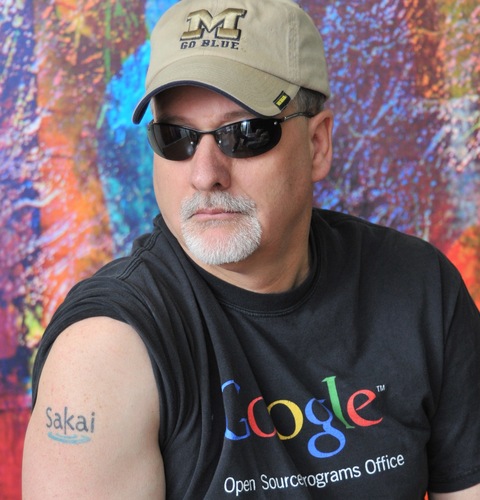
(Geek ink. Photo Severance.)
Copyright 2012 Vic Socotra
www.vicsocotra.com
Good Night Neil, and Good Luck, Mr. Gorsky
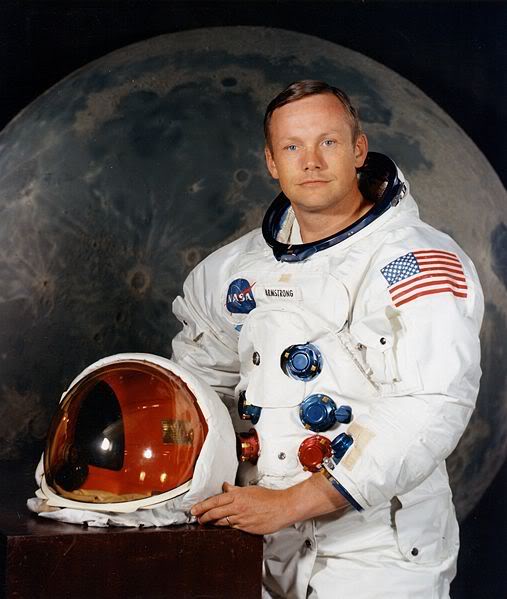
(Undated file photo of Apollo astronaut and hero Neil Armstrong. Photo NASA.)
“For those who may ask what they can do to honor Neil, we have a simple request. Honor his example of service, accomplishment and modesty, and the next time you walk outside on a clear night and see the moon smiling down at you, think of Neil Armstrong and give him a wink.” — The Armstrong family’s written statement announcing his death at the age of 82 yesterday.
We lost a modest giant yesterday, and a great American hero. Maybe the greatest one.
Neil Armstrong made an indelible impression on all of us who were alive that day in the summer of 1969. I took a certain vicarious pride in the fact that the First Man On the Moon was a Naval Aviator, like Raven. Neil had been a Korean War-era jet pilot, unlike Dad, who flew the hulking propeller-driven AD4-J Skyraider.
Neil flew his first jet the year I was born: 1951. He strapped on his F9F-2B Panther and joined the jet age. He made his first carrier landing the month I arrived on this planet in Detroit, Michigan, and then he went off to war. He disentangled himself from the Navy before the downward spiral into the Vietnam conflict commenced, and concentrated on the arcane and dangerous world of high-performance test piloting.
I remember 1969 vaguely now, and wrote these words about it a long time ago:
“It was going to be a wasted summer. It was 1969, the height of the decade which actually didn’t end until the oil crunch in 1973.
There were music festivals and loud music and I was going to be off to college soon. I was interested in the concepts of the Age of Aquarius, though I hadn’t seen much of it in the mid-western town in which I found myself stuck.
It was a great time to be alive, but my toes were tapping. I wanted to get on with things. I missed my pals, and I missed being around the Big City. My family had moved because of Dad’s reassignment. I was now in a suburb around an old brick city filled with the descendants of the hardy block-headed Dutch who populated this part of the state.
It was staid and boring. On the upside, it was easy to get beer since it didn’t seem to occur to the earnest shopkeepers that anyone would lie about their age. On the downside there was nobody to drink it with.
I was as excited as anyone that summer, following the flight of the Eagle to the moon. Buzz and Neil landed the Eagle on the lunar surface on July 20 at 4:18 p.m.
At 10:56 p.m., Neil Armstrong jumped off the Lunar Lander and that muffled quote echoed between the heavenly bodies. In between, I lay in my bed and gazed out the window where the moon hung silver in space and the ghostly images flickered on the television.
I couldn’t quite believe it. Interplanetary travel was apparently a real option. I wondered if everything was the same way: that all things, however extraordinary, were possible.
That night I looked at the moon in amazement. It was powerful stuff. I knew that then, but only remember that feeling now.”
A while back, I saw one of those Internet legends that was so appealing that I wanted to believe it was true. It goes like this, and I offer it in the spirit of Naval Aviation and the most spectacular accomplishment of humans in space. It goes like this:
“When Apollo mission astronaut Neil Armstrong first walked on the moon, he not only gave his famous “one small step for [a] man, one giant leap for mankind” statement, but followed it by several remarks–[mostly the] usual CAPCOM traffic between him, the other astronauts, and mission control. Before he re- entered the lander, he made the enigmatic remark, “Good luck, Mr. Gorsky.”
Many people at NASA thought it was a casual remark concerning some rival Soviet cosmonaut. However, upon checking, there was no Gorsky in either the Russian or American space programs.
Over the years, many people have questioned [Armstrong] as to what the “Good luck, Mr. Gorsky” statement meant. On July 5, in Tampa Bay, Florida, while answering questions following a speech, a reporter brought up the 26-year-old question to Armstrong. He finally responded. It seems that Mr. Gorsky had died and so Armstrong felt he could answer the question.
When he was a kid, Neil was playing baseball with his brother in the back yard. His brother hit a fly ball that landed in front of his neighbors’ bedroom window. The neighbors were Mr. and Mrs. Gorsky. As he leaned down to pick up the ball, he heard Mrs. Gorsky shouting at Mr. Gorsky, “Oral sex? Oral sex you want? You’ll get oral sex when the kid next door walks on the moon!”
It is too bad it isn’t true, but it demonstrates something quite profound about the astonishing times in which we have had the privilege to live. It may be pure conceit, but it seemed to truly be an American Century, from the building of the Panama Canal to the Apollo missions. From the path between the seas to men on the moon to an African American President, events challenge our ability to fully comprehend the nature of the possible.
For that age, Neil Armstrong stands as an indelible and iconic symbol. His small step off the rail of the Eagle is the stuff of dreams.
Copyright 2012 Vic Socotra
www.vicsocotra.com
Happy Birthday
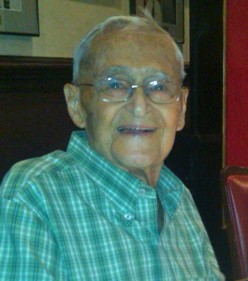
(RADM Donald “Mac” Showers, USN-Ret. Photo Socotra.)
It is Mac’s 93rd birthday today. I am hoping we get to celebrate in a low-key manner, perhaps tomorrow. The Admiral says that he only commemorates the divisible birthdays these days. 95 might be the next big one, but I think I will observe this one, at least with you.
1919 was the year Mac came into the world. It was a year in which the Nation was reeling from the Spanish Flu outbreak that followed the end of the Great War. 500,000 Americans died. The Stanley Cup could not be awarded since both teams were KO’d by the bug. Think about it. Half a million dead here a home- half a percent of everyone who lived here at the time- it makes the American contribution to the fighting in Europe seem irrelevant.
The Versailles Treaty whose confiscatory provisions against Germany would make WWII inevitable was being ratified by the Allied powers. The 18th Amendment to the Constitution was ratified by the several states, and made the onerous provisions of the Volstead Act and Prohibition possible.
Mac is not in favor of that any more than I am. But he had the opportunity to live through that failed experiment in altering human nature, and the Great Depression, which actually did alter the way people acted, at least for a few decades.
In one of our early conversations at Uncle Julio’s, we veered off backwards from what I thought we would talk about. Mac spoke more about an America where the banks were shuttered and people got by in Iowa on the barter system than we did about the pivotal moments of World War II. Mac is an ambassador from another age, and I salute his life and spirit. It is a great honor to have him as a pal.
Mac’s perspective helps put all this campaign nonsense in context. Times have been worse and more frightening than they are now. Bad as they are, things can change.
Actually, that is an understatement. Oh course they will change- that is what society does. What we are doing at the moment cannot be sustained. The numbers don’t work, and that means that whatever is coming will be radically different than what anyone says out there on the campaign trail.
It makes me sigh. We seem to be unable to have a rational national discussion about what the future is going to look like if we don’t clean up our financial disaster.
Demonizing that nice Mr. Ryan is hardly the approach. His budget approach is a gradual one, and is hardly the scorched earth that is being depicted. He only claims his approach balances the budget in a decade, and that will be three elections from now. And something is going to happen, regardless of who is at the controls.
If there is to be a bill payer- and trust me, there will be- the choices are going to be stark and unpleasant. I wish we have a rational discussion of the choices we confront.
Bashing the one percent may be satisfying, but even if the government confiscated all their wealth it would not address the structural problems of the debt or the mushrooming entitlement mess.
Just when I was going to need it, too. Crap.
That was the backdrop to a week that featured continued improvement in ambulation, so there were moments I could concentrate more on moving around than what the future holds. I drove the new Panzermobile down to Charlottesville for a meeting with the Government, listening to both liberal and deep South religious programming on the radio with more than mild befuddlement at what passes for issues in the campaign.
I have no idea about smart options to deal with the future. Stockpile gold or silver? Canned goods? Ammunition?
Silver makes sense, but in a society that has forgotten about the idea of even paper money in favor of imaginary plastic, how will the barter system work when we come to it? It is not like it hasn’t happened before. We just have forgotten about it, like the half million Americans who died of the Flu.
Mac helps us remember the context. My thanks to him for the wisdom of his years on this day.
Happy birthday, Admiral.
Copyright 2012 Vic Socotra
www.vicsocotra.com
Vacation Detective

I am stunned. Now that I am up and about again, the summer has become a chimera- a missing chapter. I am tempted to put on my Sherlock Deerstalker cap and go look for where it went.
All the time spent flat on my back was not wasted: I managed to fill it up with detectives. They all seem to be the same guy. He lives in different places.
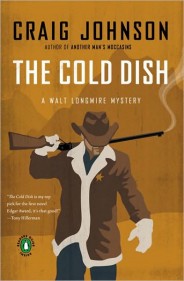
The Craig Johnson series of Walt Longmire stories features a Wyoming County Sheriff who used to be an interior lineman at USC and quotes the classics.
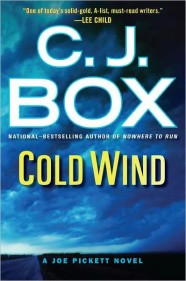
The C.J. Box series of Joe Picket who-dunnits features the most astonishing Fish and Wildlife Game Warden who ever didn’t live.
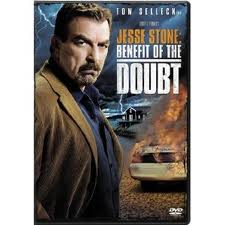
Robert Parker, who last I ran into with his Spencer series, contributes Jesse Stone in Paradise, Mass. You may have run into him on the small screen with Tom Selleck playing Jesse.
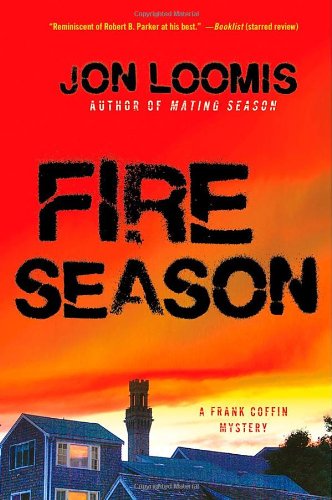
A little more obscure is Jon Loomis, who contributes beleaguered Police Detective Frankie Coffin in a sharply witty mystery series set in Provincetown, Mass.
I know this is way too narrow, and I was thankful my pal Jerry insisted on something far away and written by a remarkable woman.
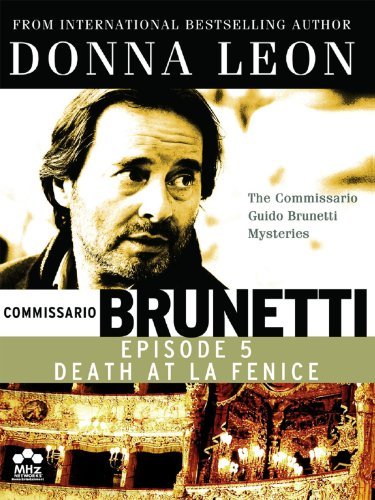
Donna Leon does a fine job with her Commissario Brunetti novels. All of them are on my iPad somewhere, though as summer comes to an end, I do not know if I will run out of her. All here stories are set in or around her adopted home-town of Venice.
I took up Donna so that I could not be accused of misogyny, either by the sex of the authors or the location in just two American states.
Did I waste the summer?
Yes. I could have concentrated on that Coursera on-line college thing I blundered into. I am struggling like hell to stay attached to something called “The History of the Internet,” which I have found is actually my history, and yours, and just the blink of a gnat’s eye in the scheme of time.
The idea that all of this stuff lives on my iPad, something else that didn’t exist until fifteen minutes ago, and that all of it can be lugged to bed or down to the pool deck now that I can do it again boggles the mind. With the exception of those collector editions of books from the Folio Society, I am not sure I am going to buy another hard copy novel.
That challenge is that, as a writer myself, I am not actually writing anything at all in a physical sense, is another freaking mystery.
Copyright 2012 Vic Socotra
www.vicsocotra.com
Posthumous
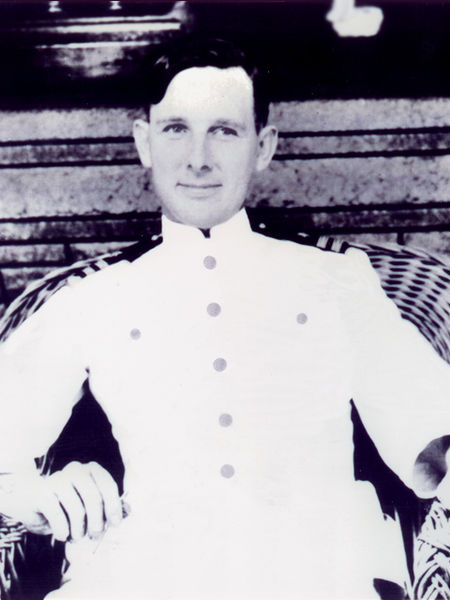
(Then-LT Joe Rochefort. A Great American, like Mac).
I have to tell you, Mac’s bottle of chardonnay was not a modest vintage. It had woody notes, and was inviting in aroma and crisp in presentation. So was President Reagan when he gave the Distinguished Service Medal to Joe Rochefort.
The years fell away as I looked over at the binder on the coffee table in front of Mac. The first picture had the iconic movie-actor whose greatest role was that of President. He looked fabulous, just as I remembered him from before the time his mind was stolen like Raven’s, and the once-bold gaze became glassy and the jowls drooped regardless of what Nancy tried to do.
“When was this, Admiral?” I asked.
Mac looked down at the binder. “May 30th, 1986,” he said. “I had been working on it for three years, the first while I was still working for the DCI. Jasper Holmes tried, in the mid-1950s, when he was back to teaching at the University of Hawaii. He got shot down, along with Fleet Admiral Nimitz. The Redman brothers and that pompous Wenger character were still around. They awarded themselves the DSM and could not bring themselves to admit that they assassinated the character of a better officer than them.”
“Joe Rochefort’s leadership at Station Hypo was one of the key aspects of the victory at Midway. And the way he was treated was shameful and embarrassing,” I said.
“True. But when President Reagan gave the DSM to Joe’s family, there was justice. Of course, only a handful of people who were there knew it, but of course nothing is easy. It gets stranger. Joe’s son and daughter were not talking. They had to have two medals and two citations.”
“Families are funny,” I said, thinking of my own. I looked curiously at the picture of the two Rochefort kids with the President of the United States, no animosity apparent.
“The son was an Army Colonel,” said Mac. “Joe Junior. I guess he didn’t want to get into a whole career fighting his Dad’s battles. Joe Senior died in 1976, but he remembered the insult to his last days. His daughter- Janet Elerding- she was there, too with her whole family.”
“I knew you took on the fight to get the medal awarded even though the statute of limitations for the award had passed.”
Mac nodded as he flipped through the Kodachrome 8-by-10s. “I got through to Jasper Holmes, who was still alive then. He was in a nursing home in Honolulu, and it took a while to get him to understand what we had pulled off. But when he realized what I was talking about, he said it was Justice, finally. There was quite a tale about how it all came to pass.”
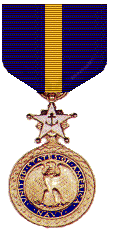
(Distinguished Service Medal. It is second on the precedence list of Navy awards, following only the Navy Cross.)
“So the medal was denied twice? I didn’t realize that.”
“Yep. Fleet Admiral Nimitz recommended it to Ernie King, but on the advice of the Redman’s, his chief of staff denied it. Then it was turned down again after the war when Jasper tried to push it through. Bu the time I started, the three son-of-a-guns who torpedoed his cryptologic career were all in their graves.”
“SECNAV was John Lehman then?” I tried to remember. Mac nodded affirmatively.
“Yes. The package got lost on the OpNav staff, and it took a while to get it in front of him. But he was a believer.”
“Confusion in OpNav?” I snorted. “Go figure. But the second Reagan administration was a good one for the Navy. Remember the five hundred ships and Strategic Home Porting?”
“Yes I do,” said Mac. “I don’t think it was just Star Wars that sunk the Soviet Union. The whole thing is very much a Cold War story, but the Iranians are in there, too.”
“What do you mean, Admiral?”
“Well, I was working for Bill Casey before I retired from the Community Management Staff in 1981. I mentioned to him that we should try for an IC award since the DSM had been turned down twice. Casey told me that it was a Navy victory and it ought to be a Navy medal, and we decided to go for it. The Iran Contra affairs had given the IC another black eye…”
“Like when don’t we have a black eye? If we have a success we can’t talk about it, and if we have a failure of any kind- operational or intelligence- it is always an Intel fuck-up.”
Mac laughed. “That has always been true, and even triumph only got Joe Rochefort transfer to command a floating dry-dock after making the primary contribution to the biggest naval battle since Trafalgar.”
“So this was all sort of a perfect storm that got Joe his medal?”
“It was. The package we put together never got to John Lehman. It had not been rejected as we thought. He didn’t know about it until Eddie Layton’s book was coming out and there was a lot of publicity about the communications intelligence we could finally talk about. George H.W. Bush had been DCI, and he was sensitive to the morale in the Intel Community. The President was committed to supporting the Contras in Nicaragua, and this looked like a good opportunity to highlight a great success.”
“Plus the Redman Brothers were dead,” I said.
“Yes, they were. But of course almost all the players in the actual event, 44 years before, were gone. Tommy Dyer. Jasper Holmes. Eddie Layton. Joe himself, of course.”
“Sometimes it is best to be the last man standing,” I said. “That would be you, Sir. Who else was at the ceremony besides you and the family?”
Mac smiled. “Not a bad turn-out,” he said, flipping to a typescript page with official stamps affixed top and bottom. “Let’s see: The President spoke briefly and handed out the medals. The citation said that Rochefort’s information ‘served as the singular basis for Admiral Nimitz to plan his defenses, deploy his limited forces, and devise strategy to ensure U.S. Navy success in engaging the Japanese forces at Midway.”
“Awesome,” I said, taking a sip of the chardonnay and feeling the oaky richness slip over my palate and the fabric of the present give way to something else, Mac’s spirit so immediate and powerful.
“Vice President George H.W. Bush was there, SECDEF Weinberger, DCI Casey and the Chairman of the Joint Chiefs, Bill Crowe. Bill Studeman was there, too, though I can’t recall if he was Director of Naval Intelligence or NSA at that point.”
“I need you to know this,” he said calmly. He pointed to the typed memo with the stamps on it. “This is one of two things I value the most, though my family probably won’t care. It came from a friend of mine in St. Louis, right out of Joe Rochefort’s personnel file. It is the justification for the DSM. He flipped the glassine envelope over, revealing another handwritten letter. ”This is the one that I prize the most. It is the one that Admiral Nimitz wrote in 1958 when Jasper tried again to get the medal for Joe.
“Whoa,” I said. “That is a historic piece of paper. Good thing it didn’t go up in that big fire at the warehouse. How did you get it?”
Mac smiled and looked off in the distance. “My pal in St. Louis said I could keep these until I was done with them.” He closed the binder. “I am not done with them.”
I toasted him with my glass of chardonnay. “I suppose you should get around to deciding where these papers should go, Sir, But not yet. Not yet.”
Mac gave me one of those Sphinx-like smiles. “No,” he said. “Not just yet.”
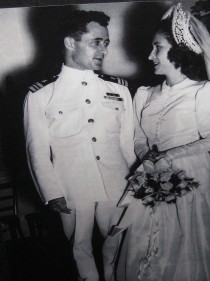
(Mac and his bride Billie, 1948. Photo Showers.)
Copyright 2012
www.vicsocotra.com
Chardonnay for Breakfast

My pal Mac has been having a course of radiation treatments for reasons I will leave for him to say, and I thought I would drop by to see how he was doing. When I talked to him over the weekend he was tired, and attributed it to the massive blasts of x-rays.
I checked in at The Madison’s front desk and went up to his floor on the elevator. I rode with a nice Filipina who was wheeling a distinguished –looking gentleman in a chair. I knew the look in the man’s eyes. While he was well groomed and well dressed in a sport-coat and fresh shirt, he was starting down the road that Raven had taken and wasn’t all there.
The lady was merry, and wore a tight blouse with a flare at the hip and tight leggings. We laughed about the coincidence of being destined for the same floor, and nothing in particular, and I let them get off before me on Mac’s floor, since I am still not moving as swiftly as I would like. I followed them along the corridor and I realized the man was Mac’s neighbor. The Filipina rolled him past Mac’s door, which was propped open, and I stopped to announce myself.
The Admiral shouted out for me to come it, and I stepped through the door and into the one-bedroom apartment, lit by the resolute light of the late August sun. He was sitting on his couch, boxes of medication on the coffee table in front of him and an oxygen tube under his nose. His walker- one of the black high-speed ones with emergency seating, tote basket and hand-brakes- was parked at the end of the coffee table, and the oxygen line was draped around on the floor like lines on a working ship.
“Hey,” I said brightly, walking with only a slight hitch across the room. “How are you doing, Sir?”
“Pain in the ass,” he said, pointing at his hip. “And the radiation is making me tired. I feel better today than yesterday, though.”
I pointed at my left leg. “Every day, better and better.”
He looked dubious. “I am not sure that covers me,” he said. “But sleeping at night is the best thing. Falling asleep in the afternoon is no good. Messes everything up.”
“That was the worst part about being confined to bed after surgery,” I said. “I couldn’t sleep regularly for weeks.”
“Amen. Care for a glass of wine?” he asked with a sly smile.
“Why Admiral,” I said in mock outrage. “It is only three in the afternoon.”
“It is not Willow happy Hour White, but you might like it. I have a little knife and a corkscrew and the bottle is on the counter in the kitchen.”
“Chardonnay,” I said gravely. “It’s not just for breakfast any more.” Mac laughed. “I think you know me pretty well. Of course I will.” I levered myself up off the couch, sharp pain radiating up both knees until I got everything straight. He did the same, only faster. “You don’t have to get up,” I said, but he already was, and swung in behind the handles of his walker. The oxygen cord threatened to coil around his leg and I was afraid it might trip him. “Don’t fall, Sir.”
“Falling is bad. I have three walkers here in the apartment and I use them to go everywhere. I hired a helper to bring a wheelchair up here to get to the bus and then to the hospital and stay with me. No chair here in the unit.”
Mac instructed me on the operation of the corkscrew, and we talked about the pluses and minuses of wheelchairs versus the practical transport chairs with the four small wheels. “My son likes the transporter,” he said. “But I prefer the ones with the big wheels so I can maneuver myself, just in case.”
I thought back to recent experiences in both. “I completely agree, Admiral. I prefer being able to move unassisted, if necessary. Or at least have the idea that I could.” I used the levers on the corkscrew to pry the artificial cork out of the neck of the bottle and admired the large tulip glass he had thoughtfully placed on the counter.
Mac turned and the oxygen line snaked along behind him. I did not know how he managed to stay untangled. I am still looking down for any possible obstruction that could through me off my feet and face down on the floor. “I have not fallen since before the surgery,” I said. “But I think the tubing would do me in.”
“You just have to pay attention to what you are doing,” he said with determination. “Take your wine with you and sit down. I have something I want to show you.”
Obediently, I sat down and he disappeared into his office. When he returned, he had a white plastic binder and he placed it on the table in front of us. He opened it, and I saw there were pictures and papers slipped into glassine envelopes. “I just got this back, and thought I had lost it.”
The first picture I saw was a color glossy of President Ronald Reagan with some people I did not recognize. The Admiral pointed at it. “I haven’t told you this story before, or only part of it. But one of the most precious things I have is in this binder.”
“Are you going to show me?” I asked.
“No, I am going to tell you the story,” said Mac. “Drink your wine and listen for a change.”
“Yessir,” I said. I really needed to get back to the office, but this was a lot more special than that. Unfortunately, now that I am almost healthy again, I have to get to the office this morning and will have to get to that tomorrow. Thank goodness there is no Chardonnay here for breakfast or I don’t know what ever would get done around here.
Copyright 2012 Vic Socotra
www.vicsocotra.com
Victoria’s Maid Brigade
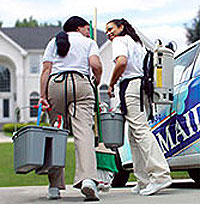
Those bastards at Comcast are still letting me down, Gentle Readers, but I found an open for-pay network in the building and I am sort of on and sort of off.
It is irritating to have to pay a daily access charge, I have to say, and between trying to generate a story that is engaging and insightful, and has no spleen about the great issues of the day, I am about at the end of my rope on the commentary front.
Plus, the Victoria and her Maid Brigade are coming this morning, and that means Victoria and her sisters are going to be all over the unit like white on rice.
You know what that means- the clean-before-the-clean, the monthly re-set of all the crap laying around that never got put away properly. It is a useful thing, like admitted women to Augusta National’s membership rolls, though not enough to offset the astonishing stupidity that is going on out on the campaign trail.
I had to puzzle over that remark yesterday by Senate hopeful Toss Aiken from Missouri- what is a “legitimate” rape, I wondered?
How does it differ from an illegitimate one? I have to go with the President on this one, as I do occasionally, and feel a little sorry for the Mittster having lunatics upstage him. I truly wish there was someone running for office that shared my fiscal concerns, scientific belief system, and a passion for personal liberty.
I was drinking with Old Jim at Julio’s last night. He is one of the legion who finds my recent regurgitation of the dawn of the Islamic Revolution in Iran to be a little too much like Dana’s Two Years Before the Mast, only lacking thematic and dramatic tension and decent writing.
“It was a long time ago,” I said defensively. “And it seemed like a way to not talk about anything that is going on now.”
“You have to live where you are living and not run off into the past,” He said. I was still marveling at Jim’s shaved head.
“Whatever possessed you to shave your head?” I asked him.
“My wife Mary said I was starting to look like an old hippy. I just told the barber to shave it all off.”
I toasted him with an insouciant glass of Pino Grigio, not a bad alternative to the Willow’s Happy hour White. I was a little unsettled, since we were not at Willow, but next door at Uncle Julio’s. Jim is continuing a principled boycott of the Amen Corner for a variety of perfectly understandable reasons. But I was a little disturbed by the caricature of a jolly Mexican featured prominently on the menus- presided over an cavernous bar and restaurant area that echoed the ambient sound and made it hard to understand anything.
Well, make that harder to understand. There is a lot going on I do not get. Plus, as I noted, Vicky and her Brigade were going to show up the next morning and I had a lot of cleaning to do to get ready.
Jim and I solved several problems and left several more alone.
“So, if Romney is ahead in October, the Israelis won’t attack Iran, right?”
Jim shook his bulldog head. “That is not what I said. The US election is the key issue in Israeli politics, and they are not going to screw that up before they have an idea of what the complete consequences.”
“I heard they might just lob a nuke high over Iran and detonate it and let the Electromagnetic Pulse- EMP- take out every electronic device in the country.”
Jim snorted. “You think once the genie is out of the bottle there won’t be nukes flying everywhere? Who is the most vulnerable nation in the world to that sort of nonsense.”
“Nonsense is right,” I said. “So, if the President is trailing Romney in October, what are the chances he is going to launch his own attack?”
“The idea is absurd,” growled Jim.
I swallowed the end of my third glass of Pinot Grigio, and signaled Tam-the-bartender for a last one, and the check. “I just wish there was a way to have Super Vicky come in every couple years with her brigade and clean out the government. We would get ready for her arrival, of course, and try to keep things tidy in between.”
“Nobody is doing that these days,” said Jim and we both sighed.
Copyright 2012 Vic Socotra
www.vicsocotra.com
